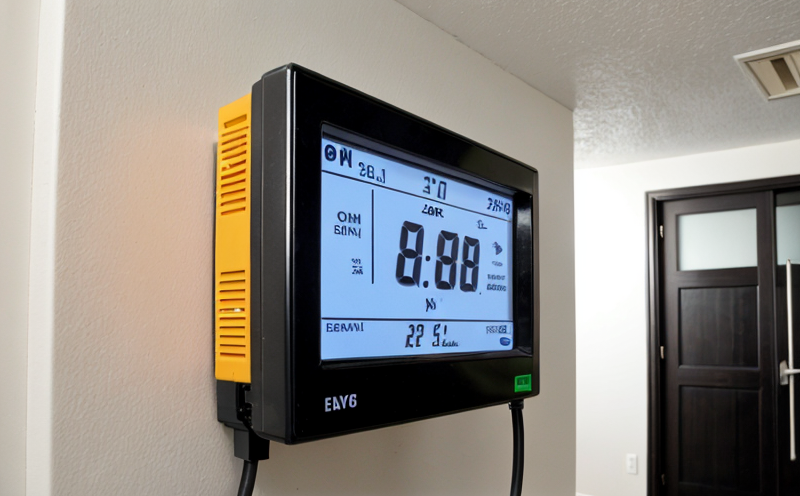IEC 62933 Energy Storage System Efficiency Testing
The International Electrotechnical Commission (IEC) standard IEC 62933 provides a framework for the testing of energy storage systems (ESS), which are critical components in modern renewable energy and smart grid applications. This standard ensures that ESS meet stringent performance, safety, and efficiency criteria before they can be deployed commercially.
IEC 62933 focuses on the efficiency aspect of energy storage systems, which is crucial for optimizing the use of renewable energy sources and reducing overall carbon footprints. Efficiency testing under this standard evaluates how well an ESS converts electrical energy into another form (such as chemical or mechanical) and vice versa during charging and discharging cycles.
The tests conducted according to IEC 62933 are designed to simulate real-world operating conditions, ensuring that the storage systems perform reliably under a variety of environmental factors. This includes temperature variations, humidity levels, and voltage fluctuations which can significantly impact efficiency.
Accurate measurement is paramount in these tests; therefore, specialized equipment such as power analyzers, calorimeters, and thermal imaging cameras are used to capture precise data points during the testing process. These tools help in determining not just raw performance metrics but also how efficiently energy is being stored and retrieved over time.
A key aspect of this testing involves monitoring parameters like round-trip efficiency (RTE), which measures both charging and discharging processes, as well as deep-cycle efficiency for repeated cycles. By adhering strictly to IEC 62933 guidelines, laboratories ensure that their findings are consistent with international standards, thereby enhancing credibility in the global market.
Moreover, compliance with this standard helps manufacturers demonstrate robust product capabilities to potential buyers and regulatory bodies alike. It provides assurance that products have undergone rigorous evaluation against recognized benchmarks, thus fostering trust among stakeholders involved at every level of supply chain management.
International Acceptance and Recognition
The IEC 62933 standard has gained significant traction across various sectors including energy, utilities, and research institutions worldwide. Its widespread adoption underscores its importance in the field of energy storage technology.
Governments, regulatory bodies, and private entities frequently cite compliance with this standard when specifying requirements for new projects or procurement processes. This recognition translates into increased market opportunities for compliant manufacturers and suppliers who can leverage their adherence to IEC 62933 as a competitive advantage.
Compliance also facilitates smoother interactions between different national standards organizations, promoting interoperability among diverse systems globally. This harmonization is particularly beneficial in developing nations where integration of renewable energy solutions into existing infrastructure remains challenging but necessary.
Furthermore, adherence to IEC 62933 can contribute towards achieving sustainability goals set forth by numerous international agreements such as the Paris Agreement on climate change. By ensuring high efficiency levels within ESSs, countries can optimize their use of natural resources and reduce greenhouse gas emissions associated with fossil fuel-based power generation.
For instance, utilities may opt for suppliers that meet these stringent requirements because they know such products will perform reliably under varied conditions. Similarly, research institutions often incorporate this standard into their experimental setups to ensure accurate comparison across different prototypes or configurations.
Competitive Advantage and Market Impact
Meeting the stringent requirements outlined in IEC 62933 can provide substantial competitive advantages for companies operating within the energy storage industry. Manufacturers who successfully pass these tests demonstrate their commitment to quality and reliability, qualities that resonate strongly with discerning customers looking for long-lasting solutions.
This certification not only enhances reputation but also opens doors to lucrative contracts and partnerships. It signals to potential investors that your organization is committed to producing top-tier products aligned with current best practices in the field. Such alignment can attract favorable attention from both established players and newcomers eager to enter this rapidly growing market.
In terms of operational efficiency, achieving certification ensures compliance with all necessary regulations while minimizing risks associated with non-compliance penalties or recalls due to substandard performance. This reduces potential disruptions to business operations and maintains customer satisfaction levels high.
Additionally, by participating in ongoing standardization efforts like IEC 62933, companies contribute positively towards technological advancements within the sector. They gain valuable insights into emerging trends and innovations through collaboration with other industry leaders, allowing them to stay ahead of competitors. This proactive approach fosters innovation and strengthens overall market position.
The demand for more efficient energy storage technologies continues to grow as countries strive to meet increasing renewable capacity targets. Companies that invest in meeting these standards are well-positioned to capture a larger share of this expanding market segment, potentially leading to significant growth opportunities.
Use Cases and Application Examples
- Solar Power Systems: Energy storage systems integrated with solar panels can store excess daytime electricity for nighttime or cloudy days, improving overall system efficiency. IEC 62933 ensures that these batteries perform optimally under varying conditions.
- Wind Farms: Wind farms often experience fluctuations in power output due to changes in wind speed and direction. By using ESS compliant with IEC 62933, operators can stabilize grid voltage and improve reliability during peak demand periods.
- Smart Grids: Smart grids rely heavily on accurate energy storage solutions to manage surplus power generated from renewable sources efficiently. Testing conducted according to this standard guarantees that these systems operate seamlessly within complex network environments.
- Homes & Businesses: Homeowners and businesses can benefit greatly from efficient ESS by reducing electricity bills through better utilization of available resources. IEC 62933 helps ensure that such products provide reliable performance over extended periods.





